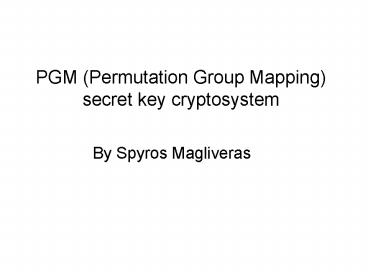PGM Permutation Group Mapping secret key cryptosystem - PowerPoint PPT Presentation
1 / 9
Title:
PGM Permutation Group Mapping secret key cryptosystem
Description:
Tame if factorization can be achieved in time polynomial in n. ... If there exist transformations to covert a tame LS to a wild LS, then a public ... – PowerPoint PPT presentation
Number of Views:154
Avg rating:3.0/5.0
Title: PGM Permutation Group Mapping secret key cryptosystem
1
PGM (Permutation Group Mapping) secret key
cryptosystem
- By Spyros Magliveras
2
Symmetric group
- A set X of elements
- A permutation is a bijective mapping X?X,
- Symmetric group Sx the set of all permutations
along with composition operation. - Sn when X1,2,,n.
- Permutation group a subgroup of Sx or Sn.
3
Permutation notations and composition operation
- Notation X1,2,3,4,5
- Standard notation ( )
- Cyclic notation (1 3) (2) (4 5)
- (1 2 5) (3 4) ??( )
- (1 3) (2) (4 5)?(1 2 5) (3 4) (1 4 )(2 5 3)
1 2 3 4 5
3 2 1 5 4
1 2 3 4 5
2 5 4 3 1
4
Logarithmic signature (LS) for permutation group
- Let G be a finite permutation group of degree n,
an LS for G is an ordered collection ? - B1 ?10, ?11, , ?1r1-1, r1 elements.
- B2 ?20, ?21, , ?2r2-1, r2 elements.
- Bi ?i0, ?i1, , ?iri-1, ri elements.
- Bs ?s0, ?s1, , ?srs-1, rs elements. Note
?ij may not belong to G.
5
LS definition
- For each g?G, it can be uniquely expressed as
- g ?sts ? ?s-1ts-1 ? ? ?2t2 ? ?1t1, for some
?iti ? Bi. - Meaning of LS a concise representation for G.
- G n rs? rs-1? ? r2 ? r1 however LS rs
rs-1 r2 r1 - LS ? induces a total order on G, thus a bijection
from ZG?G. - Terminologies
- Bi are called blocks of ? and
- r(r1, r2, , rs) the type of ? and
- lrs rs-1 r2 r1 length of ?.
- If sgt1 and rigt1, then called non-trivial.
- Tame if factorization can be achieved in time
polynomial in n. - Supertame, if factorization can be achieved in
O(n2). - Otherwise, wild.
- Let ? the collection of all LSs of G.
6
Bijection ? induced by ?
- r(r1, r2, , rs), define
- m11, mi r1 ? r2 ? ? ri-1 for i2,..,s.
- ? is bijection Zr1? Zr2? ? Zrs ? ZG as
- ?(p1,,ps) p1m1 ps ms.
- Then ?-1 (ZG ? Zr1? Zr2? ? Zrs ) is
efficiently computable by successive
subtractions. - Define bijection ?? Zr1? Zr2? ? Zrs ? G
- ??(p1,,ps) ?sps ? ?s-1ps-1 ? ? ?2p2 ? ?1p1,
- Define ZG ? G , to be ?-1??
- is always efficiently computable, but
is not, unless ? is tame.
-1
7
Definition of mapping
PGM cryptosystem Suppose ?, ? are a pair of tame
LSs. Define encryption as E?,?
-1
?
?
ZG?G?ZG, so ZG?ZG.
Define the corresponding decryption
as D?,?E?,?-1E?,?
-1
?
?
8
PGM example A5 of order 60
- Encryption of 49
- 494054
- ?-1(4,1,2)
- ???(4,1,2)
- (1)(2)(354)?(1)(23)(45)?(15432)
- (154)(2)(3) (i.e., )
- 4. Let (154)(2)(3) ?3p3??2p2??1p1
- 5. Then ?1p1 (1 5 3 4 2) so
- p14 and p14m14.
- 6. ?3p3??2p2(154)(2)(3)? ?14-1
- (154)(2)(3)?(12435)(1)(24)(35).
- 7. Then ?2p2(1)(243)(5) so
- p22 and p22m210.
- 8. ?3p3(1)(24)(35)??22-1
- (1)(24)(35)?(1)(234)(5)
- (1)(2)(354), so
- p31 and p32m320.
- 9. So 2010434.
- 10. i.e., E?,?(49)34.
?
?
pijmi
(1 4 2 3 5) (1)(2)(3 5 4) (1 2 5 4 3) (1 3)(2
4)(5) (1 5 3 4 2)
0 1 2 3 4
(1)(2)(3)(4)(5) (1 2 3 4 5) (1 3 5 2 4) (1 4 2 5
3) (1 5 4 3 2)
r15
?1p1
4
(1)(2)(3)(4)(5) (1)(2 3)(4 5) (1)(2 4 3)(5) (1)(2
5 3)(4)
(1)(2 3)(4 5) (1)(2 5 3)(4) (1)(2 4
3)(5) (1)(2)(3)(4)(5)
0 5 10 15
5
r24
?2p2
0 20 40
(1)(2)(3)(4)(5) (1)(2)(3 4 5) (1)(2)(3 5 4)
(1)(2)(3)(4)(5) (1)(2)(3 5 4) (1)(2)(3 4 5)
r33
?3p3
40
m11, m25, m320
9
Discussion on PGM
- Efficient, in particular for parallel
implementation - More flexible than DES
- If there exist transformations to covert a tame
LS to a wild LS, then a public key cryptosystem
can be built. How??
Select a tame LS ?tame, transform it to a wild
one ?, select another tame LS ?, Then ?, ? are
public key and ?tame are private key.

